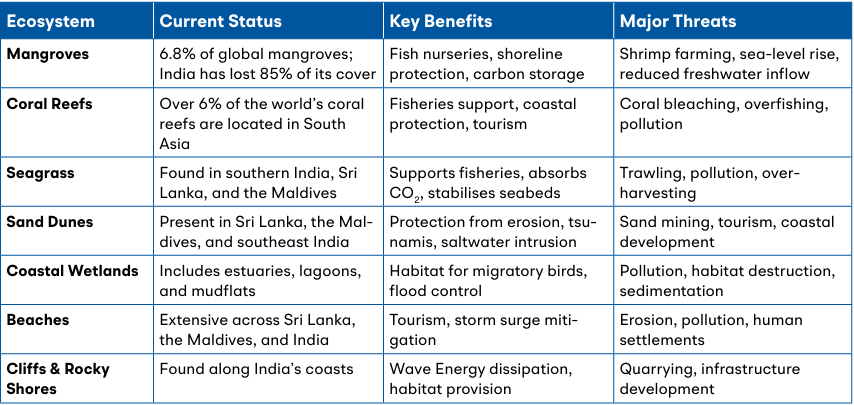Clingendael Policy Brief
South Asia’s coastal regions, home to over 250 million people, are among the most climate vulnerable in the world. Rising sea levels, intensifying cyclones, coastal erosion, and salinity intrusion, threaten livelihoods, food security, and economic stability, particularly for marginalised communities with limited adaptive capacities. Conventional adaptation strategies often prioritise infrastructure over ecosystems, failing to address the root causes of these vulnerabilities. This policy brief advocates for an integrated human and ecological security framework to enhance coastal resilience in South Asia. By linking human security— addressing socio-economic vulnerabilities—with ecological security—ensuring the health of coastal ecosystems—this approach combines climate adaptation, nature-based solutions (NbS), and sustainable development.

Drawing on case studies the brief highlights the critical role of ecosystems such as mangroves, coral reefs, and seagrasses in disaster risk reduction, climate mitigation, and livelihood support. It emphasises the need for region specific, community-driven solutions and calls for scaling up NbS, strengthening regional collaboration, and embedding ecological security into national policies to build long-term resilience.
Key policy recommendations include:
- Strengthen Nature-Based Solutions (NbS): Scale up ecosystem restoration projects like India’s Sundarbans initiatives or Bangladesh’s Coastal Greenbelt Project. Navies can support logistics and response.
- Enhance Regional Collaboration: Activate forums like BIMSTEC for coordinated action on transboundary climate threats.
- Embed Ecological Security in National Policies: Ensure that climate, economic, and disaster strategies prioritize ecosystems alongside human needs.
- Promote Community-Based Approaches: Engage local populations in restoration, ensuring equity, ownership, and sustainability.
- Develop Transboundary Frameworks: Facilitate joint monitoring and management of shared ecosystems to mitigate biodiversity loss.
- Invest in Nature-Based Infrastructure: Prioritize living shorelines and green buffers as cost-effective alternatives to hard infrastructure.
By integrating human and ecological security, the brief presents a compelling strategy to address the root causes of climate vulnerability in South Asia. It moves beyond reactive and militarized responses, advocating instead for community empowerment, ecological restoration, and long-term sustainability. This dual approach not only strengthens resilience but also redefines climate security as an inclusive, future-oriented pursuit.
Read the Policy Brief using the link here.
This policy brief is published by the Clingendael Institute in collaboration with the Institute of Peace and Conflict Studies and is written by Chime Youdon.



